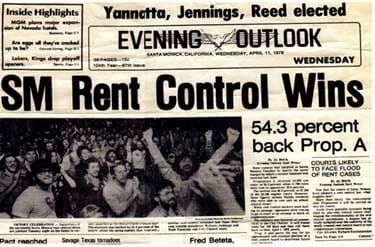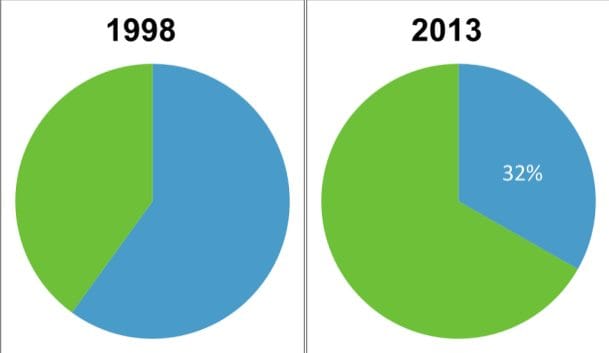
Last Thursday, the California State Assembly Housing and Community Development Committee narrowly killed a controversial bill that would have repealed the Costa-Hawkins Rental Housing Act, which limits local jurisdictions’ ability to enact or strengthen rent control laws.
In order to pass out of the committee, the bill — A.B. 1506 — needed four votes, but received only three, with two of the committee’s five Democratic Assemblymembers abstaining after voicing opposition to repealing Costa-Hawkins.
Assemblymember Richard Bloom (D-Santa Monica), along with Assemblymembers Rob Bonta (D-Alameda) and David Chiu (D-San Francsico), introduced the bill last year as part of a comprehensive package of housing bills, 15 of which were ultimately signed into law by the governor.
Among those bills, the ones that received perhaps the most media attention were Senate Bills (S.B.) 2 and 3 — more than $4 billion funding for affordable housing construction, assuming voters approve next year — and S.B. 35, State Senator Scott Wiener’s controversial streamlining bill designed to lower barriers to new housing construction.
While Bloom acknowledged the strides made last year with the housing package, he noted that there is an urgent need to help tenants now who currently live on the edge of losing their homes due to high housing costs.
“We have to be frank with one another. New units in sufficient quantities will take years to build. In the meantime, the current dramatic shortage of units contributes to rapidly escalating rents in much of the state, affecting a vast range of Californians on a daily basis, from young to old across all ethnic groups and even including those holding good, middle-income jobs,” Bloom told the committee Thursday.
He argued that repealing Costa-Hawkins, which became law in 1995, would put decisions about rent control laws back into local hands, allowing jurisdictions the flexibility to consider passing rent control laws or altering existing rent control laws to address the immediacy of the housing crisis. In part, Costa-Hawkins prevents rent control from being applied to new construction or to single-family homes or to condos.
Chiu, who chairs the committee, cited the fact that more than a third of California renters pay more than half of their income to rents.
“It is going to take a multi-prong effort, a multi-year effort to address the affordability crisis,” Chiu said from the dais. “The fact of the matter is that our economy continues to soar. Our state is the sixth largest economy in the world. But, when you factor in housing costs, California has the highest poverty rate in the country. That is unacceptable.”
The opposition focused its arguments on the proposition that repealing Costa-Hawkins would actively undermine one of the more important long-term solutions for California’s housing affordability crisis by discouraging new construction.
Assemblymember Jim Wood (D-Healdsburg), who ultimately abstained from voting on the bill along with Assemblymember Ed Chau (D-Monterey Park), said that he believed the ultimate cause of the housing crisis was the failure to build enough affordable housing to keep pace with population growth. He criticized the loss of redevelopment money, which was a major source for affordable housing funding.
He called the bill a “take-it-or-leave-it” approach.
Bloom and other supporters noted that allowing local jurisdictions more flexibility to enact rent control laws and removing barriers to increasing housing supply are not mutually exclusive strategies.
Bloom’s hometown, Santa Monica, has one of the strictest rent control laws in the state. Before Costa-Hawkins, Santa Monica’s rent control law had no “vacancy decontrol” provision, meaning landowners were unable to raise rents on units that had been vacated. That’s in contrast to Los Angeles, which has a vacancy decontrol provision baked into its original rent stabilization ordinance.
In 1998, the year before the Costa-Hawkins Act went into effect, 60 percent of Santa Monica’s rental homes were affordable to low- and moderate-income households. In 2013, that percentage shrunk to 32 percent, according to data presented to city staff at a city council meeting in 2015.

Thursday’s hearing drew hundreds of public speakers on both sides of the issue. Public testimony went on for more than two hours and was roughly evenly split between supporters and opponents of the bill.
While the bill failed to pass out of committee in its current form, Bloom and Chiu both reiterated their commitment to finding a compromise that would allow for more immediate relief for those suffering as a result of the housing crisis.
“Regardless of the outcome today, I think there is no choice but for the conversation to continue,” Bloom said shortly before the committee voted. “Win, lose, or draw, I commit to do that going forward.”
Still, voters may have a chance to weigh in on the issue as a petition is currently circulating to put the question of whether to repeal Costa-Hawkins on the ballot.
